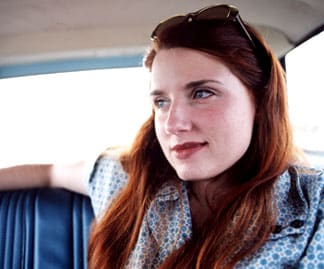When Vancouver's Be Good Tanyas won the hearts of roots music fans around the world three years ago with their gorgeous debut Blue Horse, few probably noticed how prominently the name Jolie Holland appeared in the credits. But one listen to her latest solo album Escondida, and the connection is immediately apparent in its bare-bones, hauntingly ancient sound.
Holland, a Texas native with Louisiana Creole blood, just happened to be in Vancouver when the idea of forming the Tanyas came up among her circle of musical friends. She was around only long enough to contribute to the first album before moving to San Francisco to work on her own material. "There really isn't much to tell about that time," she says. "We were all just friends making music, and I was happy to be included. But I've always done my own thing, and I'm really proud about what they've accomplished."
Holland's first solo recording, Catalpa, was actually not meant to be released. But after international word-of-mouth sales, and rave reviews in the San Francisco media, it was picked up by Anti/Epitaph. Many are still discovering that record, even though Holland considers it an appetizer for Escondida's more prepared entree. "I'm trying to be Zen about being on a big label, and not letting that affect the way I write," she says. "This album is a real mix of songs that I've been waiting to record for a long time, and things that I wasn't expecting to put on it until we started recording. Catalpa was kind of this weird art project and I'm constantly amazed by the reaction it gets."
Although Holland's dark mix of old-time blues, country and jazz is clearly her own, Escondida will undoubtedly draw some comparisons to Norah Jones' work, given the surprising success she has had with a similar, albeit more pop-friendly, approach. "I wouldn't say that we have much in common, apart from wanting to make music that's beautiful and timeless."
Holland, a Texas native with Louisiana Creole blood, just happened to be in Vancouver when the idea of forming the Tanyas came up among her circle of musical friends. She was around only long enough to contribute to the first album before moving to San Francisco to work on her own material. "There really isn't much to tell about that time," she says. "We were all just friends making music, and I was happy to be included. But I've always done my own thing, and I'm really proud about what they've accomplished."
Holland's first solo recording, Catalpa, was actually not meant to be released. But after international word-of-mouth sales, and rave reviews in the San Francisco media, it was picked up by Anti/Epitaph. Many are still discovering that record, even though Holland considers it an appetizer for Escondida's more prepared entree. "I'm trying to be Zen about being on a big label, and not letting that affect the way I write," she says. "This album is a real mix of songs that I've been waiting to record for a long time, and things that I wasn't expecting to put on it until we started recording. Catalpa was kind of this weird art project and I'm constantly amazed by the reaction it gets."
Although Holland's dark mix of old-time blues, country and jazz is clearly her own, Escondida will undoubtedly draw some comparisons to Norah Jones' work, given the surprising success she has had with a similar, albeit more pop-friendly, approach. "I wouldn't say that we have much in common, apart from wanting to make music that's beautiful and timeless."
